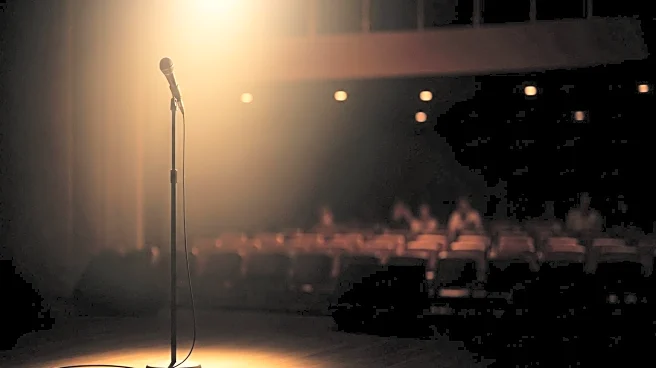What's Happening?
Louis C.K. has publicly defended his decision to perform at the Riyadh Comedy Festival in Saudi Arabia, despite facing criticism from fellow comedians. During an appearance on 'Real Time With Bill Maher,' C.K. highlighted the positive reception from the audience and noted the unexpected openness of the event, which included performances by diverse comedians. He emphasized that the festival had only two restrictions: jokes about religion and government, which he found manageable. C.K. described the festival as a unique opportunity to engage with a budding comedy scene in a region where acts are typically censored. His participation has sparked debate among American comedians, with some, like David Cross, criticizing the moral implications of performing in Saudi Arabia.
Why It's Important?
The participation of high-profile comedians like Louis C.K. in the Riyadh Comedy Festival marks a significant cultural exchange between the U.S. and Saudi Arabia. It highlights the potential for comedy to serve as a bridge in regions with restrictive speech laws. However, it also raises ethical questions about performing in countries with controversial human rights records. The event has sparked discussions on the role of comedians in challenging or conforming to censorship, and the impact of such performances on perceptions of freedom of speech. Comedians and audiences alike are grappling with the balance between cultural engagement and ethical considerations.
What's Next?
The controversy surrounding the Riyadh Comedy Festival may lead to further discussions among comedians and cultural commentators about the ethics of performing in countries with restrictive policies. It could influence future decisions by artists considering similar engagements. Additionally, the festival's reception might encourage more international events in Saudi Arabia, potentially fostering greater cultural openness. Comedians may continue to debate the implications of participating in such events, weighing the benefits of cultural exchange against the potential endorsement of restrictive regimes.
Beyond the Headlines
The Riyadh Comedy Festival's reception suggests a gradual cultural shift in Saudi Arabia, where entertainment and arts are becoming more accessible. This development could signal broader changes in societal norms and openness to diverse perspectives. The festival's success might encourage other artists to explore opportunities in the region, potentially influencing Saudi Arabia's cultural landscape. However, the ethical debate surrounding participation in such events underscores the complexities of engaging with countries that have restrictive policies.









